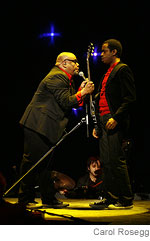From Rachel Cohen’s A Chance Meeting:
After they had been friends for six years, [Elizabeth] Bishop sent Moore a new poem, “Roosters”–“At four o’clock / in the gun-metal blue dark / we hear the first crow of the first cock.” Bishop described her roosters “marking out maps like Rand McNallys” with: “glass-headed pins, / oil-golds and copper greens, / anthracite blues, alizarins.” Marianne Moore and her mother were so upset by “Roosters” that they stayed up until three o’clock in the morning rewriting it, taking out everything that smacked of vulgarity, particularly a most objectionable reference to a “water-closet.” Bishop kept the poem as she had written it, but she and Moore remained close friends–testament to how loyal and sure they both were.
In his introduction to One Art, a collection of Bishop’s (amazing) letters, Robert Giroux observes that Moore (and her mother) even changed the title of “Roosters”, noting parenthetically, “their choice was ‘The Cock’.”
Rewriting of “Roosters” aside, Moore, it should be noted, was an early and important champion and mentor of Bishop’s. She also sat on a panel that awarded Sylvia Plath a first prize in a poetry contest while Plath was at Smith. Yet, a few years later, when Plath sent her a group of poems and requested a reference for the Saxton grant (Moore had previously written a reference for Plath’s husband Ted Hughes), Moore was less supportive. As Anne Stevenson writes in her biography of Plath, Bitter Fame:
In July, to Sylvia’s surprise and keen distress, Miss Moore sent her in reply what Sylvia saw as “a queerly ambiguous spiteful letter… ‘Don’t be so grisly,'” she commented; “you are too unrelenting.'” And she added “certain pointed remarks about ‘typing being a bugbear.'” Sylvia concluded that Miss Moore was annoyed because she had sent carbon copies instead of fresh top sheets. That seems unlikely. While Marianne Moore usually admired Ted’s work, she never warmed to Sylvia’s, disliking the early traces of the very elements that later were to carry her to fame: macabre doom-laden themes, heavy with disturbing colors and totemlike images of stones, skulls, drownings, snakes, and bottled fetuses — hallmarks of Sylvia’s gift.
I will forever love “Don’t be so grisly!” as a remark to Plath.
RELATED: Marianne Moore’s suggestions for the naming of a new model of Ford, submitted in 1955. Alas, the car company didn’t pick The Utopian Turtletop, The Mongoose Civique orThe Turcotingo, and went with the Edsel instead.

 •
•